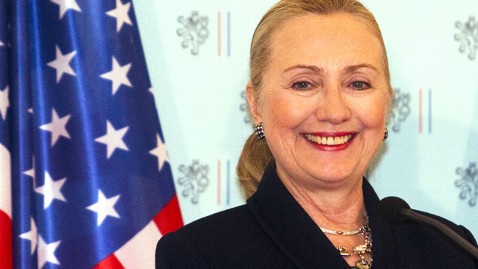
Michal Sula/MAFRA/isifa/Getty Images
The blood clot that put Secretary of State Hillary Clinton in the hospital was found in her head between her brain and skull behind the right ear, her doctors said today.
“It did not result in a stroke, or neurological damage,” her doctors, Drs. Lisa Bardack and Gigi El-Bayoumi, said in a joint statement. “To help dissolve this clot, her medical team began treating the secretary with blood thinners.”
The doctors said Clinton will be released “once the medication dose has been established.”
Clinton, 65, was admitted to New York Presbyterian hospital on Sunday for treatment of a blood clot stemming from a concussion she sustained a few weeks ago, a Clinton aide said.
“In the course of a routine follow-up MRI on Sunday, the scan revealed that a right transverse sinus venous thrombosis had formed. This is a clot in the vein that is situated in the space between the brain and the skull behind the right ear,” the doctors said.
“In all other aspects of her recovery, the secretary is making excellent progress and we are confident she will make a full recovery. She is in good spirits, engaging with her doctors, her family, and her staff,” the statement said.
Clinton was supposed to be back at work at the State Department this week, but now the date of her return in unknown.
Details of Clinton’s blood clot had not been immediately released after her hospitalization.
Members of Congress wished Clinton a speedy recovery today, while pressing their call for her to testify before Congress about the U.S. consulate attack in Benghazi.
“We just want to say how much Secretary Clinton is in our prayers this morning and hope she recovers rapidly from this health problem,” Sen. Joe Lieberman, I-Conn., said at a press conference today. Lieberman is chairman of the Senate Homeland Security Committee.
“Secretary Clinton has made clear that she will testify. And I think that’s a good idea,” said Lieberman.
House Foreign Affairs Chairman Rep. Illeana Ros-Lehtinen, R.-Fla., tweeted get well wishes to Clinton Sunday night, but also mentioned Benghazi. “Wishing Secretary Clinton a full + speedy recovery!,” Ros-Lehtinen wrote. “She’s looking forward 2 testify on #Benghazi and is bummed she can’t travel now like b4.”
The committee released a new report last week which concludes that the security system was “flashing red” in Benghazi shortly before Ambassador Christopher Stevens and three other Americans were killed in an attack by terrorists on Sept. 11. The report cited a “rising crescendo of evidence” from the U.S. intelligence community that Benghazi had become “dangerous and unstable, and that a significant attack against American personnel there was becoming more and more likely.”
Lieberman called the administration’s reaction to the flashing red indicators as “woefully inadequate.”
Sen. Susan Collins, R-Maine, said she thinks other must be held accountable at the State Department, in addition to those who have already resigned following the release of the State Department’s internal investigation. The Accountability Review Board issues a scathing report which faulted some senior management at the State Department for the breakdown of security and resulted in the four officials stepping down.
“My hope is, and my expectation is, that once Secretary Clinton is well enough, that she will carefully review our report and see if there are other officials that need to be held accountable,” Collins said. “It is difficult for us to make that judgment, but I believe that it is likely that there are others that do need to be held accountable.”
The congressional report found that the environment in Benghazi was dangerous and that local security was inadequate for protection. The report also found that the departments of Defense and State had not jointly assessed the availability and the accessibility of U.S. assets to support the mission facility in Benghazi in the event of an attack, such as the one that occurred.
“We should have closed this facility in Benghazi until we were prepared to provide the security necessary to give minimal protection, adequate protection to American personnel,” Lieberman said.
The report concludes that it is clear that terrorists were responsible for the attack on the consulate and that the administration response bouncing between the State Department, the Pentagon and the intelligence community added to some “confusion” over the attack.
Many conservatives have been skeptical of Clinton’s illness, with former U.N. ambassador John Bolton telling Fox News Clinton had come down with a “diplomatic illness” to avoid testifying on Dec. 2o, a charge the State Department vigorously denied.
“These people do not know what they are talking about,” spokesperson Victoria Nuland responded.
Dr. Howard Markel, a practicing doctor and medical historian at the University of Michigan, tells ABC News that history shows the best response to rumors is transparency. The State Department did not disclose that Clinton had a concussion until several days after it occurred and currently waited a day to disclose what part of her body her blood clot is in, leaving the media and others to make assumptions about the seriousness of her condition.
“In the absence of information, this kind of speculation often takes up the vacuum,” says Markel, who points out that Clinton is receiving excellent medical care and that her condition sounds treatable.
State Department officials say they have been transparent about the secretary’s health, keeping the press and the public aware of all major developments within a reasonable amount of time, but they also maintain that Clinton is entitled to some degree of medical privacy, a claim Markel says held up historically but does not today.
“If you’re a private person, you are entitled to your privacy as a patient. When you’re a public figure and you’re working on behalf of the American people, you give up many aspects of your privacy,” he said.













